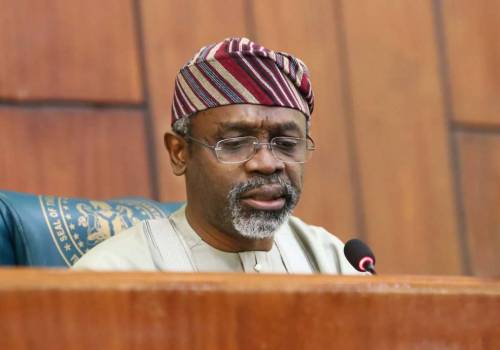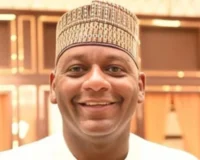The House of Representatives, yesterday, passed the Electoral Act (Repeal/Re-enactment) Bill, 2021, after the full consideration of the report on the bill by members in the Committee of the Whole.
The Committee of the Whole was presided over by the Deputy Speaker, Rep. Ahmed Idris Wase, in line with the rules of the House.
The bill was subsequently read for the third time before the House adjourned for its yearly recess till September 14, 2021.
The majority of the 158 clauses of the bill were passed intact, including Clause 52 (2), which initially generated tension among members.
The clause, which provides that the Independent National Electoral Commission (INEC) shall determine the mode of voting/transmission of election results, was left intact after attempts made by some members between Thursday and Friday to amend it failed.
The retained Clause 52 (2) reads, “Voting at election and transmission of results in this Bill shall be in accordance with the procedure determined by the Commission.”
This clause, therefore, leaves INEC with the option to use either electronic or manual transmission of results.
The Senate had last Thursday passed its own version of the Bill, which requires INEC to seek clearance from the Nigerian Communications Commission (NCC) and the National Assembly before deploying electronic transmission of election results in any part of the country.
The clause generated serious disagreement among members earlier on Thursday, following which the Speaker, Femi Gbajabiamila, invited the Nigerian Communications Commission (NCC) to address the House on whether the country had attained the capacity to seamlessly transmit election results from across the 36 states and the Federal Capital Territory (FCT, using available telecommunications services.
NCC’s Director of Technical Services, Malam Ubale Maska, while testifying before the lawmakers, disclosed that only 50.3 per cent of the 190,000 polling units in the country were covered by 2G and 3G networks.
Claiming that the remaining 49.7 per cent was without network coverage, the NCC official maintained that only a 3G network could adequately transmit the results.
Maska further admitted that INEC server was susceptible to manipulation by hackers even as the INEC Chairman, Mahmood Yakubu, failed to appear before the House to state his own side of the issue.
The House, upon receiving the briefing by the officials, resumed consideration of the bill, sticking to its decision to retain the original provision empowering INEC to determine the mode of voting and transmission of election results.
The few clauses of the bill amended were 1; 5(2); 6; 36(3)(b); 49; 87(2): and 113(1).
The bill was, however, passed in absence of the Peoples Democratic Party (PDP) members, who had earlier staged a walkout led by House Minority Leader, Mr. Ndudi Elumelu.
Addressing his colleagues after the bill was passed, Gbajabiamila thanked them for their commitment to passing it, describing the bill as a “very important” one to Nigerians.
Gbajabiamila, who touched on the burning issue of electronic transmission of results, appealed for understanding. He said much as it was the wish of many Nigerians, including himself, to have electronic transmission of results, available evidence suggested that it had yet to be possible because of the lack of capacity to deliver such a major task.
“I believe we all have been better informed by the NCC people. We wish to have electronic transmission of results, but we do not want to disenfranchise anybody.
“Even if it’s one person’s vote that will not be counted, then we have not achieved our desire to have a transparent election,” he stated.
The Speaker buttressed the point made by the NCC that no system was free from being hacked into, adding that Nigeria might be losing at the end of the day if it hurriedly opts for the electronic transmission of results.
“What we are even talking about here in our case, is electronic transmission of results; we are not talking about electronic voting. I believe we will get there one day as we continue to work on improving our electoral system,” he said.
Spokesperson of the House, Mr. Benjamin Kalu, who later briefed reporters, also adduced explanations offered by the NCC official as basis for the decision to give INEC the discretionary powers over usage of electronic transmission of poll results.
“Nobody is against electronic transmission of results. We are looking at what is on ground. It is not for people to say what they want. No Nigerian should be disenfranchised. As it stands, it is not possible for all Nigerians to be covered. We want INEC to determine what to do on the issue,” he argued.
But Elumelu, who led dozens of opposition lawmakers to brief reporters, alleged that the position of his colleagues on electronic transmission of results was part of the grand design by the APC-led administration to rig the 2023 poll.
He added: “We cannot be part of that fake process of depriving Nigerians of their rights for their votes to be counted accurately because electronic transmission of results will guard against fraud. It will guard against rigging and votes can count. But what they have done now is to discountenance our agitation that there should be transparency in the next conduct of our elections.”
Meanwhile, human rights activist and a Senior Advocate of Nigeria (SAN), Ebun Olu-Adegboruwa, yesterday, said neither the National Assembly nor the Nigerian Communications Commission (NCC) could dictate to INEC on election matters.
This is even as the Socio-Economic Rights and Accountability Project (SERAP), has described the Bill passed by the Senate as “illegal and deleting ‘independence’ from INEC and seriously undermining the ability of the electoral body to conduct transparent elections.”
Adegboruwa, who was reacting to the Senate’s decision, said Section 78 of the Constitution gives only INEC power over procedure of elections not NCC or the National Assembly.
He stressed that the proposed amendment to the Act as determined by the Senate on the issue of transmission of results would violate the Constitution.
“Neither the Constitution nor the Electoral Act recognises the NCC in the process of election. The National Assembly cannot take over the role of INEC when most of them will be candidates in the same election they seek to regulate. We cannot hand over the procedure of election to partisan politicians,” he added.
Also reacting, Chief Goddy Uwazuruike, a lawyer, insisted that it was wrong for the National Assembly to hang the issue of electronic transmission of election results on the Nigerian Communications Commission (NCC).
Uwazuruike stated that NCC had no business with election matters, adding that the lawmakers have shown that they were not ready to move the country forward and free Nigerians from poverty.
He said: “What happened in the National Assembly between Thursday and Friday could be described as a debacle to our democracy. It is like a preconceived end. I can tell you that there is no way you can actually regulate INEC by any authority whatsoever except the court. They cannot dictate for the INEC how to go about elections within the purview of the constitution.
“So this idea of bringing in NCC on them is unconstitutional. What will still hold for the 2023 election if we have a judiciary then is that they will speak out on those amendments, which will now leave INEC to swim, survive or perish.
“The events at the Chambers of the National Assembly are a shame on the nation by men endowed with wisdom but who have decided to throw away their wisdom. It is a shame on this country that we have legislators who cannot stand up for democracy.”
A Port Harcourt-based lawyer, Chief Festus Oguche, also described the amended Electoral Act as a reflection of how unserious the political elites are in entrenching reforms in the electoral sector.
“It has become somewhat a hollow tradition of subtle reluctance at tinkering with existing legislations towards a radical departure from our flawed electoral process through reforms.
“The whole essence of elections is for popular participation in the electoral process in exercise of sovereignty through the ballot, but so far what the system has provided are impositions of persons into political offices through the back door, which has thereby alienated people from the streams of governance.
“What is currently happening in the National Assembly is reminiscent of what happened when the Justice Uwais Commission report was tabled before the 7th Assembly. In spite of the laudable recommendations contained therein, the legislators took one look at the document and threw it overboard. Now, they are the very people on the other side of the political divide shouting for reforms.
round comes round. The very people that were against reforms today were the ones pushing for it that time when they were yet to get into office, so it becomes a game of roulettes and a vicious cycle of inanities and incongruities.”
Oguche added that the current move at reforms through the amendment procedure only touch on the peripheral issues, but does not go into the rubrics of the substantive areas that will provide the necessary guarantees for free, fair credible and transparent elections.
“These are in the areas of the composition, funding and operations of INEC. But then the attitude of the legislature in wholesomely giving the necessary legislative nod to the use of electronics process in the transmission of results tells me a whole lot of their disposition to reforms.
“They are gripped with the fear of the unknown as per their electoral fortunes knowing fully well that they don’t stand a chance in an ambience of credible polls and would not want the tables to turn against them. Again, reforms of the magnitude envisaged in the electoral system cannot be accomplished via a half-hearted approach but a holistic mechanism that will entrench the much needed values and standards that will assure the sanctity of the ballot and credibility of the polls,” he stated.
SERAP’s Deputy Director, Kolawole Oluwadare, described the amendment as fundamental breach of public trust, noting that the group would challenge the provision in court if signed by President Muhammadu Buhari.
He added: “Given the history of election violence and corruption over the years in the country, opacity and a toxic culture of secrecy in elections would exacerbate electoral corruption, grand corruption and impunity.
“The refusal by the National Assembly to allow electronic transmission of election results shows a systemic failure of leadership at the highest level of government, and suggests that our electoral process is deliberately skewed in favour of politicians’ interests, who continue to profit from the corruption and impunity that have characterised the process since 1999, and against those of the citizens.”
“This is a blatant attempt by politicians to take over the functions of the electoral commission and to undermine the integrity of the electoral process.”
“This exercise of legislative powers is a fundamental breach of constitutional and international obligations, including on transparency and accountability, and has seriously undermined Nigerians’ right to participate in their own government.”
Speaking in the same vein, former National Chairman of the United Progressives Party (UPP), Chief Chekwas Okorie, described the development as “tragic”.
He stated that an opportunity that could have deepened the fledgling democracy of the country has been shattered on the altars of self-aggrandisement.
He said: “What is happening in the National Assembly with regard to electronic transmission of results of elections is tragic to say the least. I wouldn’t know what Senators and members of the House of Representative understand their role to be – whether they understand that they are there representing Nigerians who elected them or their personal interests. The preponderant of opinion in Nigeria is that Nigeria is ripe for electronic transmission of results and that is one more step that will deepen our democracy and make our elections credible and transparent and remove most of the violence that characterize our elections. There won’t be any need to hire thugs and all sorts of criminals to go and waylay the results from the polling stations and collation centres and impose something that did not represent the aspiration of the people. This is one aspect of legislation that would have returned the sovereignty of Nigerians to them in determining who represents and governs them. Now Nigerians have been denied that. Now they have returned us back to square one. It is unfortunate. The ugly part of it is the inability of those who know what is at stake to abstain from voting. Any person who abstained from voting has added to the failure of the electronic transmission of voting, which Nigerians clamoured for.”
Meanwhile, the Peoples Democratic Party (PDP), yesterday, disclosed that it would take all necessary legal steps to ensure the position taken by the two chambers of the National Assembly on the transmission of election results is nullified.
National Chairman of PDP, Uche Secondus, stated at a press conference in Abuja.
“We have mandated out members; we are in consultation with our members to take every necessary legal action to make sure that Nigeria will have the best of the electoral law in terms of amendment.
“It must be very transparent, and we must ensure that it is carried out by the public and INEC. It happened in Edo and Ondo where election results were transmitted, it was seamless. There was no confusion there; there was no burning down of Houses; people didn’t gather at a spot. “
According to the PDP chairman, “if this electoral laws are amended to suit Nigerians not to suit a particular political party, you will see that the insecurity that is attached to elections, rigging and all that will be totally eliminated.”







